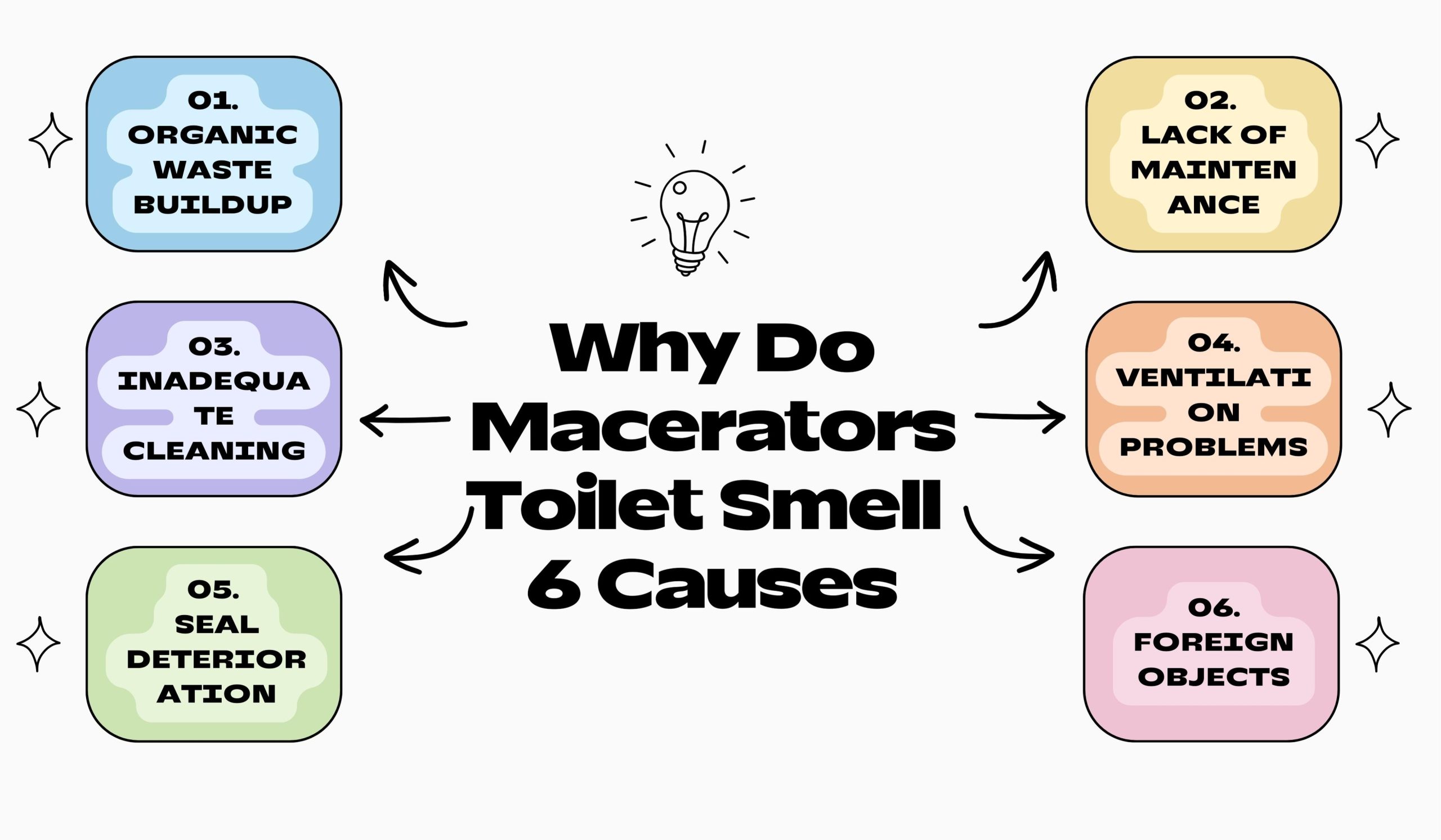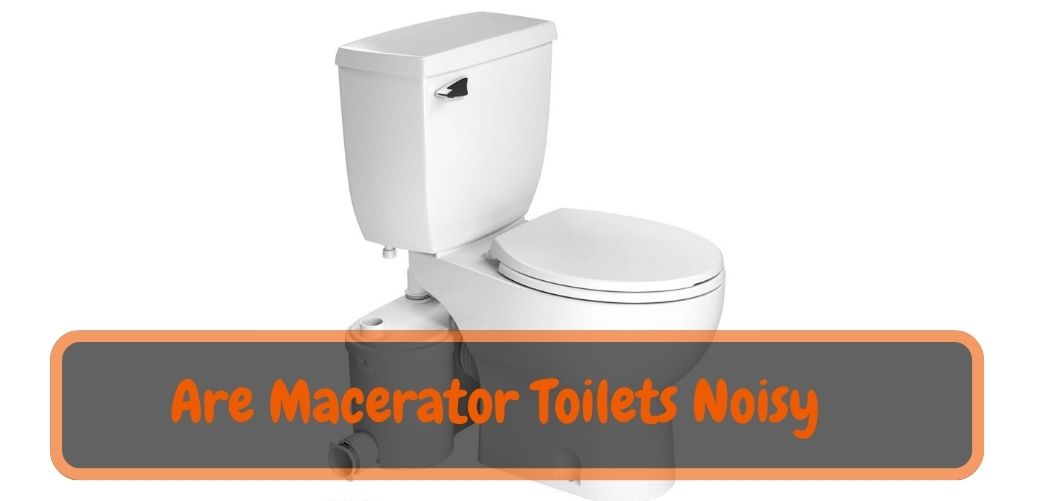Macerators can smell bad for different reasons. Usually, the bad smell comes from organic matter that gets stuck and breaks down in the system. Here are some common reasons why macerators may develop odors:
01. Organic waste buildup:
Macerators crush and pump organic waste. They can break down food scraps and human waste into smaller pieces. If these particles are not flushed away or there is a partial blockage, they can build up and decompose. This decomposition process produces foul-smelling gases.
02. Lack of maintenance:
Like any other plumbing system, macerators require regular maintenance to function properly. If you don’t clean the macerator regularly, organic matter can build up and cause bad smells.
03. Inadequate cleaning:
Cleaning the macerator regularly is essential to prevent odors. If you don’t clean the unit well or skip certain parts, it can smell bad due to leftover residue and debris.
04. Ventilation problems:
Proper airflow prevents unpleasant smells caused by sewer gases in plumbing systems. If the macerator’s ventilation is blocked or not working well, it can cause bad smells in the living area.
05. Seal deterioration:
Macerators have seals and gaskets that prevent water and waste from leaking out. Over time, the seals can get worse or break, so smells can come out.
06. Foreign objects:
Certain items should not be thrown into a macerator. These include non-biodegradable materials and too much grease and fat. They can get stuck in the system. These foreign objects can impede the macerator’s operation and contribute to odors.
To avoid macerator odors, make sure to clean and inspect regularly and be careful what you put in the system. If you notice strong smells coming from your macerator, get help from a plumber or technician.
Also Read: Unveiling the Mystery: How Macerating Toilets Work?
How do you keep a macerator clean?
Keeping a macerator toilet clean is essential for its proper functioning and longevity. Here are steps and tips to help you maintain a clean macerator toilet:
- Regular Cleaning: Clean the toilet bowl with macerator-safe cleaners.
- Use Recommended Products: Use approved cleaning products to avoid damage.
- Check for Blockages: Inspect for blockages and remove any debris.
- Flush with Water: Flush occasionally with clean water.
- Proper Usage: Only flush appropriate, biodegradable materials.
- Scheduled Maintenance: Follow the manufacturer’s maintenance schedule.
- Address Issues Promptly: Address problems promptly to prevent damage.
By following these cleaning and maintenance practices, you can ensure that your macerator toilet remains clean, functional, and free from unnecessary problems.
Also Read: Unlocking the Mystery: How Big is a Macerator Toilet ?
The Advantages and Disadvantages of a Macerator Toilet!
Here are a table of the advantages and disadvantages of a macerator toilet.
| Aspect | Advantages | Disadvantages |
|---|---|---|
| Installation | – Easy to install in locations without a traditional sewage system. – Can be retrofitted into existing bathrooms. | – Requires professional installation, which can be costly. |
| Flexibility | – Allows flexible placement in various locations within a building. – Suitable for basement or remote areas. | – Limited in terms of vertical pumping height and distance. |
| Space Efficiency | – Requires less space compared to traditional plumbing systems. – Ideal for small bathrooms or tight spaces. | – May have a larger footprint compared to conventional toilets. |
| Cost-Effectiveness | – Cost-effective for locations without easy access to sewage lines. – Saves on excavation and plumbing costs. | – Upfront costs are higher than traditional toilets. |
| Environmental Impact | – Can be more environmentally friendly if water usage is reduced. – Saves water by using less per flush. | – Consumes electricity during operation, adding to utility bills. |
| Functionality | – Efficiently grinds waste into a fine slurry, making disposal easier. – Reduces clogging and blockages in the sewage system. | – Mechanical components may require frequent maintenance. – Noise during operation can be a nuisance. |
| Usage Flexibility | – Compatible with various fixtures like showers, sinks, and bathtubs. – Versatile in handling different waste types. | – May struggle with certain types of waste, causing potential issues. |
Keep in mind that the advantages and disadvantages listed here are general and may vary based on specific models or brands of macerator toilets. It's important to research and consider your individual needs and circumstances before deciding if a macerator toilet is the right choice for your situation.
Also Read: How to Unclog Macerator Toilet? The Proper Guide!
FAQ: Macerator Toilet Odor and Blockage
Q1: Why do macerators sometimes emit a urine-like odor?
A: Macerators can produce a urine-like odor due to a buildup of urine residues, inadequate cleaning, or bacterial growth in the system. Regular cleaning using macerator-safe cleaners and proper flushing with water can help address this issue.
Q2: Why do macerators sometimes produce a sewage-like smell?
A: A sewage-like odor from a macerator toilet could indicate a blockage or incorrect disposal of non-biodegradable items. Blockages can lead to stagnant waste and unpleasant smells. To prevent unpleasant odors, make sure to dispose of waste correctly, maintain regularly, and only flush suitable items.
Q3: How can I clear a blocked macerator toilet?
A: If you encounter a blocked macerator toilet:
- Turn off the macerator unit to prevent further problems.
- Remove any visible debris or foreign objects causing the blockage.
- Attempt to clear the blockage using a plunger by creating a seal and applying pressure.
- If the blockage doesn’t go away, you can try a plumbing snake or auger to clear it.
- If the blockage doesn’t go away, call a plumber or toilet expert to fix it.
Closing Reminder: Improper cleaning, stagnant residues, and bacterial growth can cause macerator toilets to emit unpleasant odors resembling urine or sewage. Regular cleaning, correct disposal practices, and prompt maintenance are key to maintaining a fresh and odor-free macerator system.










